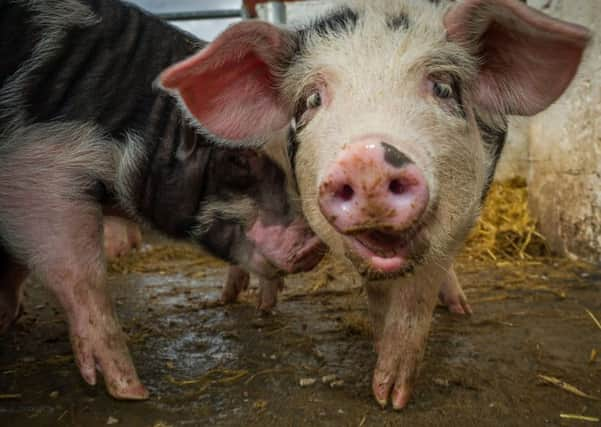Moves to '˜save' pig sector after Brechin abattoir fire
This article contains affiliate links. We may earn a small commission on items purchased through this article, but that does not affect our editorial judgement.


Steps include a temporary derogation of the requirement for pigs eligible for the Specially Selected Pork brand so they can be slaughtered outwith Scotland.
• READ MORE: Farming news
Quality Meat Scotland (QMS) said that pigs which would have been slaughtered at Brechin could now be slaughtered in another Tulip-owned abattoir at Ashton-under-Lyne in the Midlands.
Advertisement
Hide AdAdvertisement
Hide AdThe derogation was offered following an inspection visit to the processing plant by QMS, the Scottish SPCA and QMS’s quality assurance certification provider, Acoura. QMS stressed the derogation would be subject to stringent conditions and would be reviewed weekly.
QMS chairman Jim McLaren confirmed the move had been made as Brechin accounted for around two-thirds of the pigs slaughtered in Scotland and the industry was facing exceptional circumstances.
“QMS is keen to support the Scottish pig and pork industry to limit the impact of the temporary closure of this abattoir, including any animal welfare implications,” he said.
McLaren described the fire – which police are investigating as to whether it was started deliberately – as “a blow for the Scottish pig industry”.
He added: “It is particularly galling that this damage has occurred soon after the opening of the increased capacity at the site following a period of significant investment.”
The Scottish Government has also provided a temporary relaxation to limits on lorry drivers’ hours to get around longer journey times. Cabinet secretary for the rural economy and connectivity Fergus Ewing said the measure was essential for the welfare of animals and the effective operation of the supply chain.
Advertisement
Hide AdAdvertisement
Hide Ad“The impact of this incident means the number of pigs being moved weekly from Scotland to England will increase from 7,000 to around 12,000,” Ewing said.
“With no other large abattoirs in Scotland, the only option left is to transport the livestock to facilities in the north of England.
“This will still be a challenge for the industry, given the limited pool of authorised drivers and trucks, but we stand ready to offer further assistance where we can.”
Fresh hope of eradicating BVD
The almost glacial progress towards eradicating bovine viral diarrhoea (BVD) from Scotland’s cattle took another small step forward yesterday with the launch of a consultation to consider whether heftier sanctions should be placed on herds that still have carriers of the disease.
The plan aims to put responsibility and power into the hands of farmers and encourage them to eliminate BVD from their own herds.
• READ MORE: Farmers pushed to cull ‘persistent infected’ cattle
In launching the 12-week consultation, Fergus Ewing said: “The complaint I hear most often in relation to BVD is that farmers want to see non-compliant herds penalised because they are putting the majority at risk of infection or reinfection.
“The consultation includes proposals which would make it increasingly difficult for farmers to continue to have BVD virus active in their herds, by actively inconveniencing them.
Advertisement
Hide AdAdvertisement
Hide Ad“BVD is one of the most harmful diseases of cattle in terms of economic cost and welfare, and we recognise that eradicating it requires a more holistic approach based on both stronger incentives and heftier sanctions. That is why we are supporting the industry in its continued efforts to eradicate this disease from our herds.”
NFU Scotland president Andrew McCornick pointed out a significant amount of time, cost and effort had already gone into the BVD eradication programme.
“While great strides have been made by the clear majority of the nation’s cattle keepers, it is apparent from the number of persistently infected animals being identified, that further measures that move Scotland closer to BVD free must be considered,” he said.